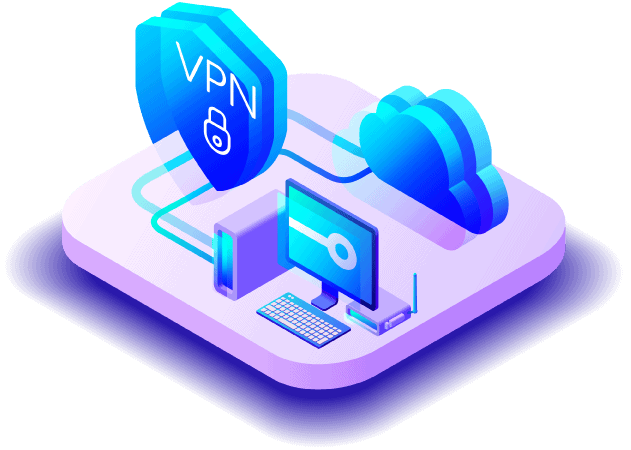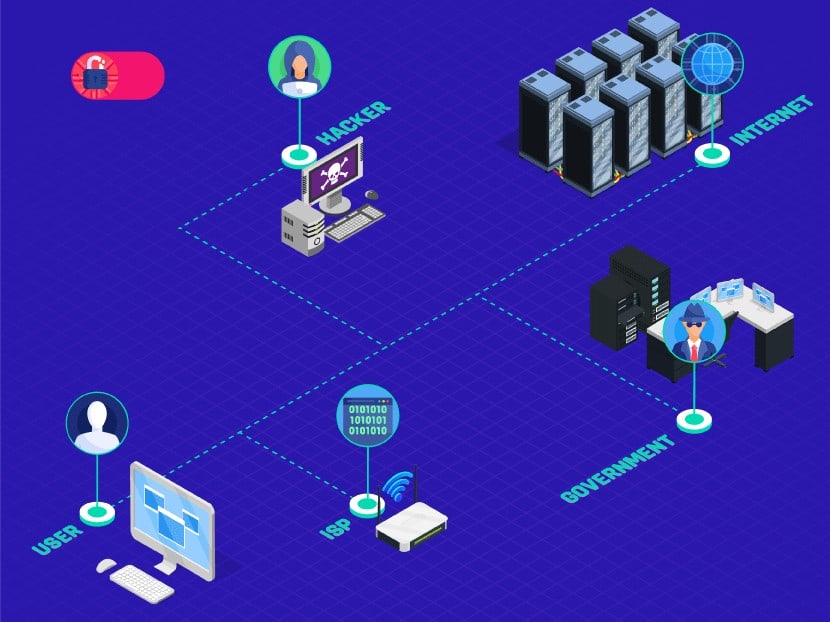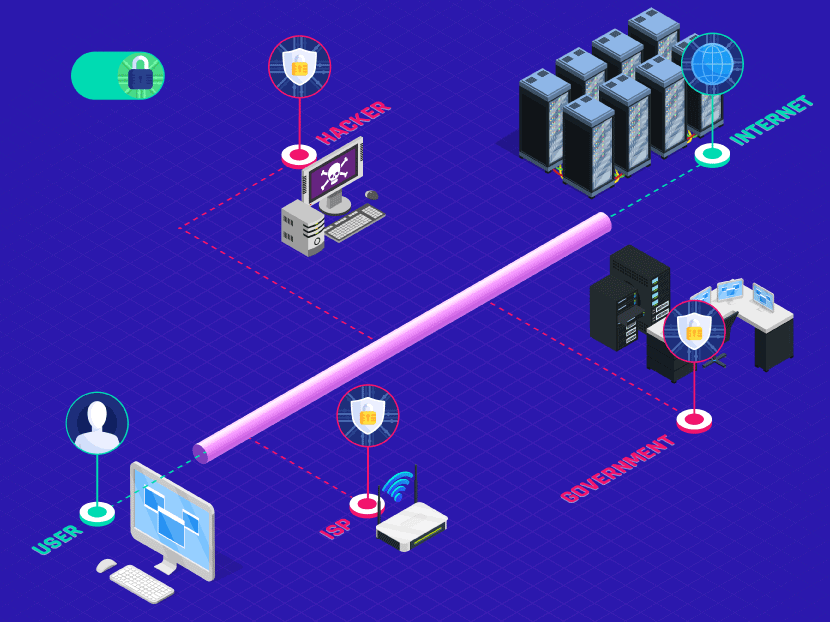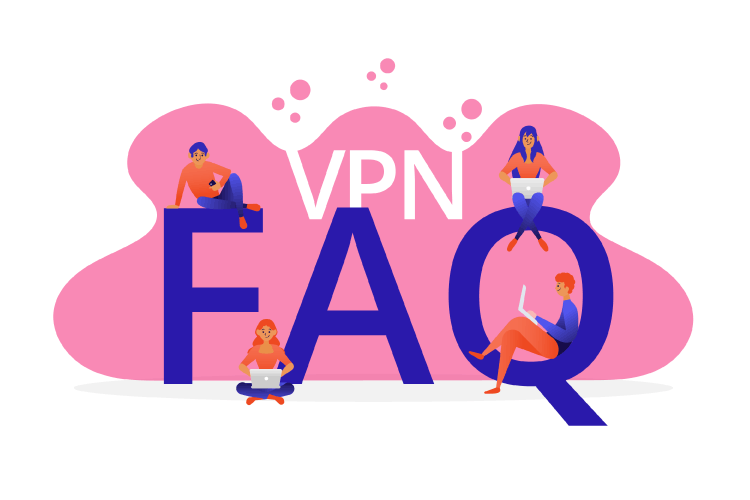This website uses cookies to improve user experience. See details

VPNs have been getting more and more popular over the last few years. Despite all the buzz around them, most people don’t even know what these digital tools are.
Newcomers to the VPN world can quickly become overwhelmed with all sorts of doubts. What is a VPN, what is it for, and why should I use one? If that’s your case, don’t worry! You’ll find answers to all those questions and more right here! Understand the power of a VPN and make the most out of it.
In short, a VPN is a simple way to enhance your safety and privacy online, among other benefits – like unblocking geographically restricted content and services. A VPN enables all your devices to access the Internet through a secure network, protecting your data while you’re online.
By using a VPN connection, you raise your defenses against several types of digital threats. The best VPN providers offer high-end encryption and tunneling technologies to keep your traffic safe all the way.
VPNs are vital tools in a connected world. You’ll find more details in the following sections on all a VPN can do for you.


To understand the VPN meaning, it might be helpful to split down the acronym into smaller pieces. VPN stands for Virtual Private Network.
Virtual refers to the process of Virtualization [1], in which VPNs are created. They run on virtual machines, separated from the computers’ hardware powering these “machines.” Thus, a single computer could, for example, host several “machines” simultaneously.
Private means it’s owned by a company and not publicly available. The access is restricted and granted to authenticated users only.
Network refers to a web of physical and virtual interconnected machines that communicate using the same protocols and share resources.
Too technical? So, let’s try a more friendly approach.
To get a clear idea of what a VPN is, imagine a tunnel on a highway. When you browse the Web without a VPN, it’s like you were driving your car on an open road. You might probably be wondering: “what’s wrong with that?”
The problem here is that if your car is on the highway, it is completely exposed. Someone with access to the same road could easily see what the car looks like, who the driver is, follow your route, destination, and so on. A VPN is like a private tunnel on a public road. You can drive safely through that tunnel, hidden from prying eyes.
At this point, it’s important to clarify two other questions you might be asking yourself: “who might be watching me and what kind of details exactly would they be able to see?”
In an increasingly digital world, we’re always online. We send and receive data through our devices all day, every day. If you are a typical Internet user, you have a wireless network at home. You also have mobile access to the Web through your smartphone and connect to public Wi-Fi networks regularly.
You shop online, register to websites, subscribe to digital services, access your digital bank account, and so on. All these actions involve data traffic [2] within digital service providers, from simple interactions to more sensitive online transactions.
To make this happen, we’re always in contact with many other people and organizations, even without realizing it. Here is where the problem begins.
Any of those organizations may be seeing your personal information and storing it without your permission. Every one of those is probably tracking your online activities. You might even be under government surveillance for some reason.
The worst is that all sorts of cybercriminals are also out there, spying on people and looking into ways to steal personal and sensitive data. Each day more and more people become a victim of identity theft worldwide.
I know, it’s creepy! Let’s name a few of these snoopers to give you a better idea of the scenario. It starts with the Internet Service Provider (ISP) installed a modem in your home and the company you pay for using your mobile phone.
And this goes far beyond Telecom, the internet browser you use, the search engine you type your queries in, the apps running on your devices, and the GPS on your smartphone: they are all tracking you.
Even your beloved social media channels have your (unaware?) consent to gather data about you, to share and sell it to third parties [3].
These concerns might not seem a big deal for some people. But things can turn out nasty when you browse the Internet incautiously. Many threats are lurking on the Web. Most of the time, we’ll be just fine. Suddenly, by any chance, something unpredictable happens.
Online trolls, cybercriminals, “shady governmental employees,” and many other insidious characters are out there, looking for the next victim.
When I talk about data, I mean virtually any piece of information related to your personal life. The potential damage depends exclusively on what you usually do online. It ranges from trivial things, like your behavior and habits, particular interests, and browsing history to more sensitive data. Those possible leaks can overflow onto personal information, your location, documents, credit card, and banking details.
The Cyber Risk Index (CRI) predicts the risk of becoming a cybercrime victim in 50 selected countries. It's an initiative from NordVPN with data collected and analyzed by Statista.
Simply put, a VPN improves your security and expands your possibilities while browsing the Internet. Most of its applications are related to privacy protection, cybersecurity, and freedom of choice. But there’s a lot more a VPN can do for you in the digital world.
The VPNs’ same technology to secure your online activity can make your access to content and digital services completely borderless. In fact, research shows that most VPN users put unblocking geo-restricted content as their primary purpose when using this kind of service.
We will talk about all the VPNs’ uses further in this article. For now, think about them as essential tools to help keep your right to privacy and fight cyber threats. Let’s see how VPNs do it.
A VPN can provide an encrypted and cloaked data traffic environment. In general, good VPNs do a great job creating digital tunnels between internet users and their final destination online. When you access the Internet using a VPN connection, your data travels between your device (computer, smartphone, tablet, etc.) and a website through an entirely covered pathway.
To successfully establish safe connections, VPNs rely on robust communication protocols and cutting-edge cryptography. Communication protocols are responsible for data integrity and reliable authentication between users’ devices and the private network.
Integrity refers to the assurance that all data passing through the tunnel remains intact, without external interferences, and consistent, free of errors. Authentication, on the other hand, prevents unauthorized users from accessing the network.
Modern encryption processes provide confidentiality, meaning all data inside the tunnel is encoded so no one can read it without the decoding key.
As long as the VPN connection is active, your device will be communicating exclusively with a safe, private network. This network acts as a middle-man, connecting with the public Internet on your behalf. Only the VPN network is, at the same time, in immediate contact with you, on one side and the Internet, on the other.
To better understand this concept, imagine you were to take the metro. Obviously, to use this means of transport, you have to walk to the closest metro station first. If you live in the same neighborhood for enough time, perhaps some nearby people will recognize you when leaving home at that moment. Maybe someone watches you from a distance and notice you stop by the newsstand to buy cigarettes. As you enter the metro station at 8 AM, someone could even guess you’re going to work.
But the moment you reach the station entrance and go downstairs, anyone who may be snooping your life can no longer watch you. Likewise, people that see you leaving the metro station at your destination have no clue where you came from or where you’re heading.
Now, picture a scenario where nobody could see or recognize you all the way long. This privacy level is what you’ll get if you use a VPN tunnel to browse. Your Internet browsing will leave very few traceable digital fingerprints if any at all.
I know it all sounds a little bit like a spy movie, and I’m sure bad guys are not following you – unless you’ve done something stupid, of course. Actually, I’ve used this example just for the sake of making more evident how VPNs work.
But trust me, in the digital world, there’s plenty of prying eyes watching you and keeping records of all your steps. It’s sad but true. So if you didn’t read this article section on why you should use a VPN, I suggest you do so.
Maybe you are asking yourself: “Why would I need to hide my activity?” Well, there are many daily life moments when you don’t want people watching you. Think about things you may want to keep private. Some common cases where a higher level of discretion is desirable are buying pregnancy tests, doing medical exams, seeing a therapist, consulting a divorce lawyer, watching adult films, staying away from home for a few days, etc. The list is virtually endless. The same applies to your online life.
VPNs can spoof your actual IP address – something similar to a postal code for Internet users –, changing it for another. So when your traffic is routed through a server located in Germany, for example, that will be your apparent location, even if you were on a paradisiacal Thai beach. In other words, it would be tough to trace any browsing activity back to the original locality or device. That ensures your online actions have a much higher level of privacy and anonymity.
VPNs also encrypt all the data exchanged between your devices and the private network. This encoding process is a great way to keep things confidential, even for people with access to the network. Modern VPNs use military-grade encryption methods, which are currently unbreakable, even for state-of-art quantum computers.
That’s why it is vital to use only trustworthy VPN providers with robust security infrastructure, reliable privacy protocols, and an absolute no data logs policy. It helps ensure they won’t share users’ information with third parties, namely, The Big Brother – I’m talking about Orwell’s BB, not the TV show ; ). With no logs of any kind kept on the VPN’s servers, they will not be capable of sharing details on your online activity at all, even if bound by law to do so. They’ll have absolutely nothing to share.
Now you know that a VPN can dramatically increase your security and privacy online. But in what situations is it going to do that? What additional benefits can you get from using a VPN beyond security?
There are great uses for a VPN in your daily life. Typically, we can sort these benefits into three groups based on the final goal: security, privacy, and freedom. Let’s talk about each of them so you can get to know all the possibilities.
When you access public Wi-Fi networks unprotected, you can get yourself in serious trouble. Your browsing activity exposes you to several types of network onslaughts when you’re not using a VPN. From sophisticated attacks – like “Man-in-the-Middle” – to more common risks, such as outdated software installed on the Wi-Fi router, there are all sorts of threats out there.
VPNs can secure your internet connection and encrypt your traffic, making it unreadable to other people.
A VPN also helps in protecting all your devices from malicious content online. The Web is full of dangers: malware-infected websites, phishing links, and files contaminated with viruses. Good VPN services can block most of those hazards, keeping you away from any pitfalls.
A safe virtual environment is paramount for your online financial activities. For obvious reasons, this is the most threatened area in your digital life. That’s why you must keep your banking access credentials and crypto-currency assets behind solid walls. Having a VPN service with the highest cybersecurity standards makes all the difference for your money.
While we’re online, we leave a lot of traceable tracks and digital fingerprints behind. The websites you visit, the searches you perform, the content that interests you: they watch us all the time.
Yep. The Internet Service Providers (ISPs), phone companies, and software companies spy on you, track your online behavior and monetize on this data. Although being entirely anonymous online is impossible, you can get closer to this by taking defensive measures like using a VPN to increase your privacy.
VPN providers usually have web servers spread across many countries and cities. When you connect to the internet using one of those servers, you change your IP address and your apparent physical location with it. With a VPN, you can access the Web practically as if you were at any place in the world. A VPN server will help you mask your actual geographical location, making it much more difficult to guess where you are.
Some VPN companies offer unique features called double-hop or multi-hop connections, making it even more challenging to find your address as these VPNs route your traffic through two or more servers.
Nowadays, there’s more data about us online than ever before. We are continually sharing private information, no matter how privacy concerned we may be. The truth is sharing personal data online is essential in many cases. We access government websites, subscribe to digital services, fill in signup forms. That’s a big part of our digital life.
Unfortunately, there’s no realistic way to stay entirely off the grid. And the more sensitive the data we share, the more exposed we become. Doxxing, swatting, identity theft are just a few among several unethical – even criminal – practices that can cause many problems to a person.
To keep control over this, you need to share your sensitive data through secure channels, protected behind modern encryption methods. That’s one more benefit a serious VPN can provide.
Dictatorial and autocratic governments around the world are continually narrowing the path to free access to information. Even some of the self-proclaimed democratic nations are engaged in mass surveillance practices.
Regardless of where you live, VPNs can offer you a way to bypass any censorship-imposed restrictions and preserve your right to information. To be a conscious and well-informed citizen, you need facts and news from diverse sources, whether they’re public, official, private, alternative, or foreign.
Most popular VPN services offer servers spread all over the globe. You can benefit in two ways when it comes to content access. First, you’ll be able to connect to a server located inside your home country and watch your favorite shows whenever you’re abroad.
On the other hand, you can access content exclusively available in other regions. Unlocking foreign content libraries from both video and audio streaming services can be easy with a suitable tool.
But you’ll need a suitable VPN provider with servers in the chosen country and powerful obfuscation capabilities to avoid being detected. The latter is especially important to unblock foreign libraries on Netflix and other streaming giants, like Amazon Prime Video or Hulu.
Many e-commerce websites charge different prices based on the user’s geographical location. It means you can pay significantly more for the same product or service than someone in another country. Also, travel sites usually raise airfare and hotel prices based on user behavior. Damn algorithms! They don’t play fair.
VPNs can help you save money in both scenarios. They will spoof your IP, so your buying websites cannot track your behavior or geolocation. Some VPNs can also help you reduce your mobile data spend by blocking undesired promotional and ad content that can eat your data fast.
Some VPNs offer dedicated servers and unique features optimized for peer-to-peer file-sharing. These perks might grant you a more secure and anonymous downloading experience while boosting performance at the same time. Even better, you can rest assured no one will be sniffing around your torrenting activities. With a VPN proper for torrenting on your side, nobody can tell what you’ve downloaded or shared through P2P platforms.
Internet providers can be nasty! Some of them advertise unlimited bandwidths and high speeds, but they restrict your traffic whenever they want. If these services notice you enjoy streaming services or take advantage of torrenting platforms, they might limit your connection speed. That is mean, but it happens all the time. And they probably warned you, in tiny letters hidden among thousands of words, within the terms of the service.
But you can be more intelligent than they are by using a VPN connection. After all, you’re already paying for the service! A private network can prevent your ISP from seeing what you are doing online. In other terms, you won’t be tracked, avoiding any possible bandwidth limitation or speed decrease.
Every place has its blocklist of forbidden websites (primarily social media). Sometimes they don’t want you to do your things if you’re at school or the office. It’s frustrating, but it’s not unusual. Chances are they’ll get you blocked somehow. But as the Pink Floyd lyrics say: “We don’t need no thought control!” Turn on your VPN and free yourself.
Despite all the technical vocabulary, using a VPN is super easy, quick, and cheap. I’m serious! You can set up a VPN and start using it in a few minutes.
First, you need to find a good, trustworthy VPN provider that suits your profile. Choosing the right one depends on how you plan to use it and your experience level. But don’t worry: there’s always an excellent choice for your particular needs in the VPN Adept’s selection.
Second, download the software (or mobile app) to all devices you want to protect. If you have other people in the same household, you should use a VPN that offers unlimited simultaneous connections. Even if it’s only you, an average user usually have 3 to 5 devices to protect. Think about smart TVs, laptops, tablets, game consoles, streaming gadgets, and smartphones.
After installation, open the app and click on the button to turn on the VPN connection. It’s pretty much the same process for every VPN service. If you need to, you can select a specific location (country, city) to connect through, depending on the available servers. VPNs with a proper kill-switch feature will turn on automatically whenever you’re online (it’s the ideal configuration).
The best VPN providers will do all the hard work on your behalf. You’ll only need to set it up once (maybe tweak it a little for specific use cases). That is undoubtedly a small effort for the benefits you’ll be getting from the VPN. Keep your safety and your freedom of choice hassle-free.

Take a look at the FAQ page to find answers to VPN users’ most common questions and problems.
This website uses cookies to improve user experience. See details